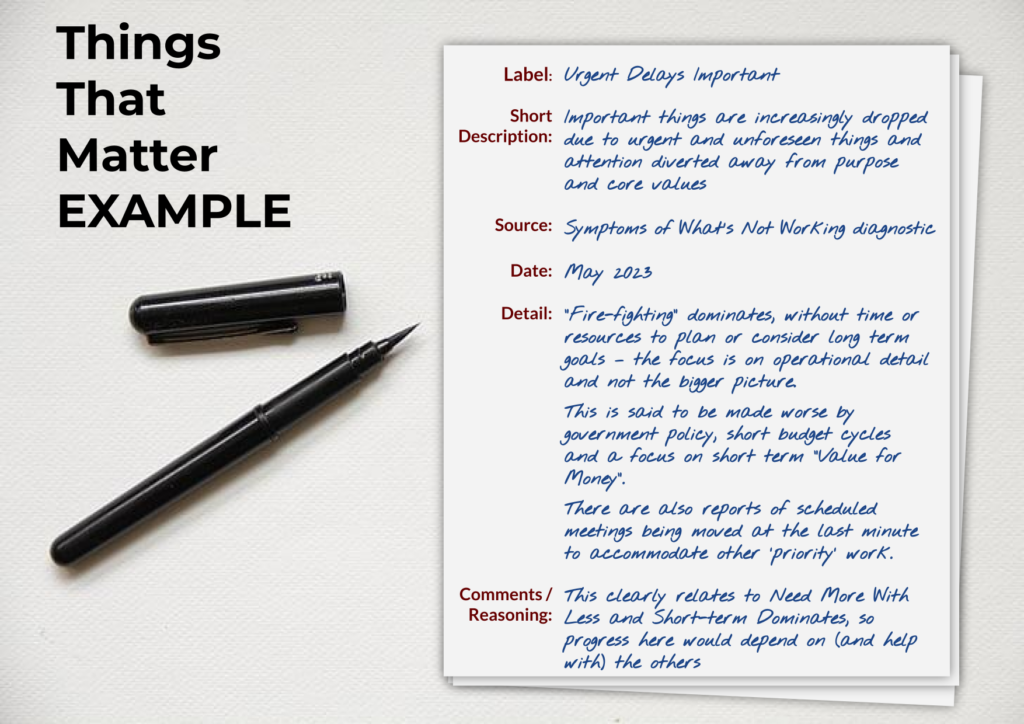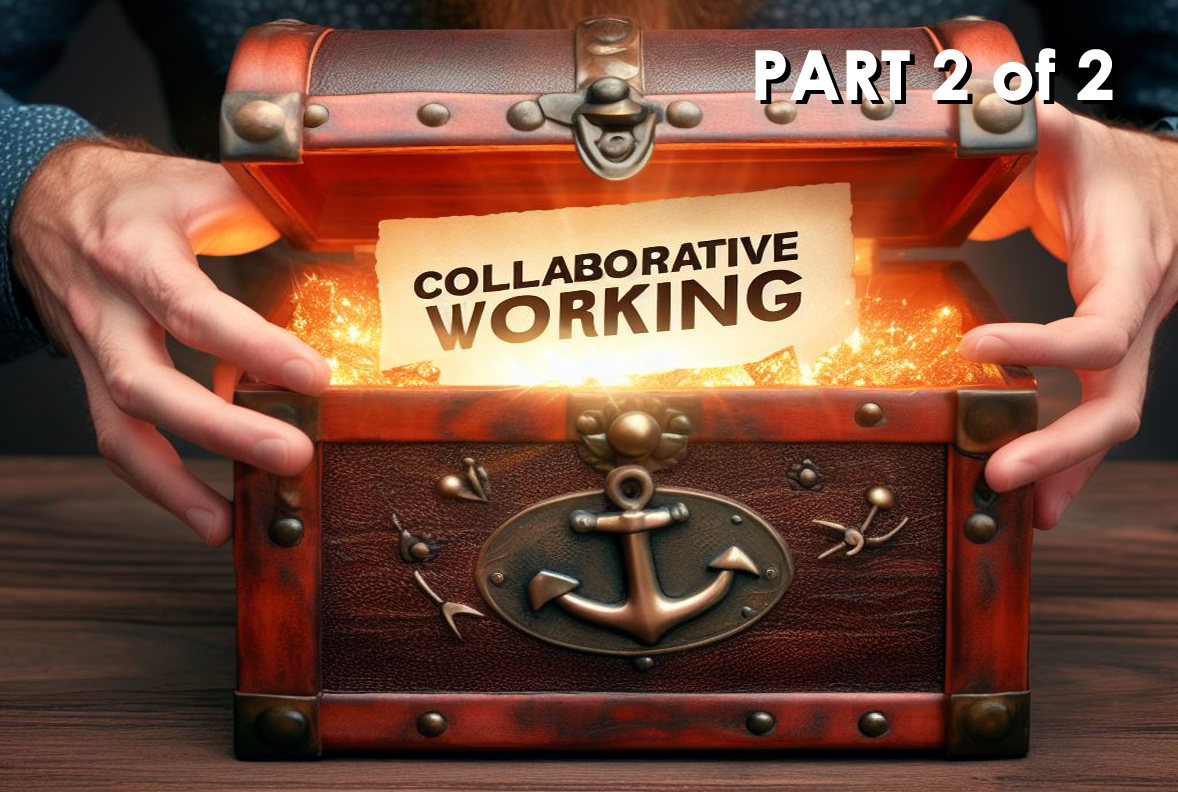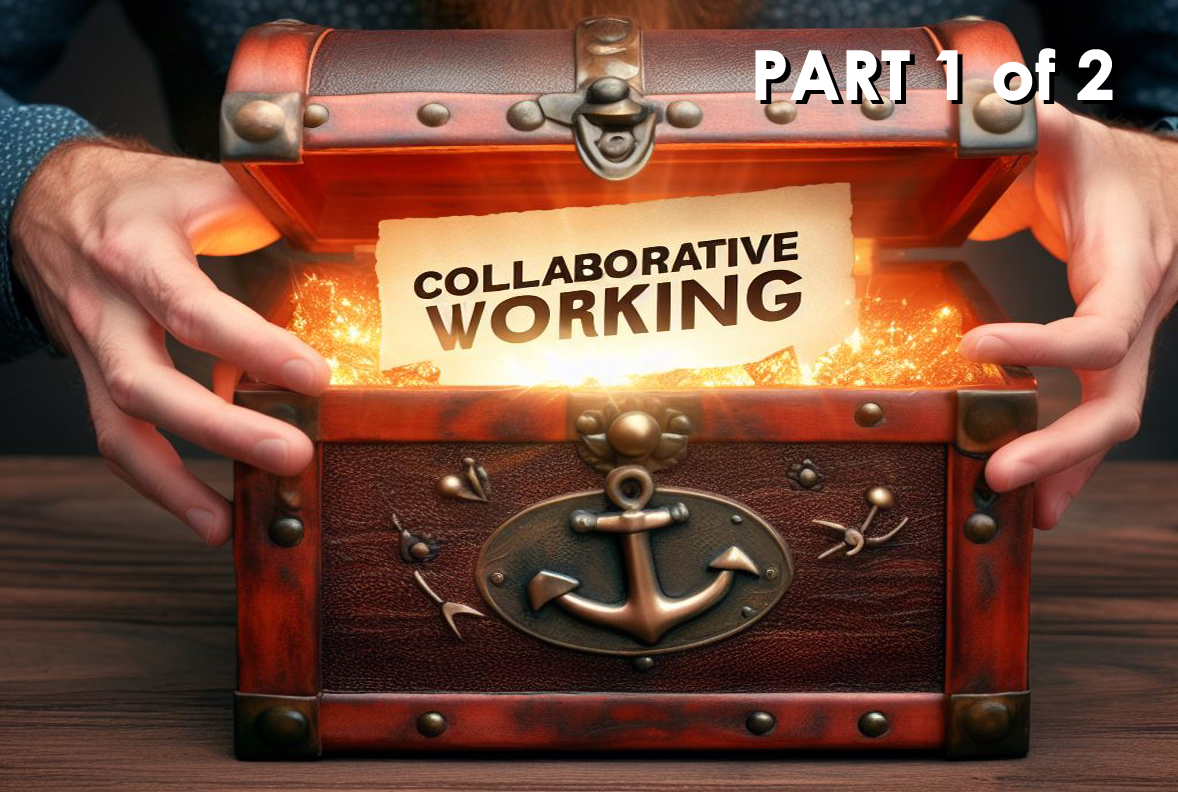Value Management: Things That Matter
Establishing, focusing-on and delivering-on the Things That Matter is at the core of Value Management.
Does that sound simple? It’s not.
Surely it’s what everyone is already doing? It’s not.
To understand why, we need to look at:
- What we mean by “Things That Matter”
- Why they are so pivotal and challenging
- Why people aren’t focused on them as they need to be
What are “Things That Matter”?
The Things That Matter are anything and everything that constitute Value: Value firstly to end customers, and then – from there – Value to your organisation, your employees, your stakeholders and your partners.
The Things That Matter are therefore the currency of Value. They include goals, targets, values, risks, issues, concerns and far more besides:
- Some will be towards-the-positive (e.g. “achieving competitive advantage over x“), whilst some will be away-from-the-negative (e.g. “we need to resolve this dispute to make progress“).
- Some will be also be neutral or driven by external factors (e.g. “this market requires us to be ISO-accredited“).
- Some will be long-term and fundamental (e.g. “not using single-use plastics“); some will be time-dependent and situation-specific (e.g. “appoint new CFO by Christmas“).
What the specific Things That Matter are will vary greatly with context, and especially Ecosystem positioning and Lifecycle stage – e.g. in a negotiation or planning stage, values and goals are more likely in focus; later, it is likely issues that will come to dominate.
However, at every stage, whilst some Things That Matter will be objective and concrete, many – usually most – will be subjective and intangible.
Why Things That Matter Are So Pivotal and Challenging
The first clue is in the name – these things matter.
The Things That Matter are what define and motivate organisations, their projects and their relationships; they are what your customers, stakeholders, employees and partners will ultimately judge you on.
The Things That Matter are pivotal.
It is therefore imperative that the Things That Matter are established, focused-on and delivered-on, but that’s where it gets challenging. Why?
Because the most critical Things That Matter are typically subjective, which means they don’t feature in contracts (at least not effectively) and even less so in how projects and relationships are managed and measured.
Such Things That Matter will usually be broad, vague or both – emotionally important, but hard to know what to do with – and it often won’t be clear what action could be taken to address them, at least directly.
Further compounding the challenge is that People also naturally gravitate to the objective, the quantifiable and the easily-measurable – these things give us a (largely false) sense of control and order, attracting disproportionate focus and attention.
Things That Matter Therefore Aren’t In Focus
Most would assume that the Things That Matter are what their organisation, its employees, its stakeholders and its partners are all focused on – everyone just “knows” and agrees what things matter and what to do about them.
However, we now see that isn’t the case: most of the key, subjective Things That Matter fall outside conventional approaches, and even if an attempt is made to articulate them, it’s usually top down and vague, e.g. in corporate values, mission statements, behavioural charters, etc.
Even if such vehicles contain the “right” Things That Matter (unlikely), they are largely disregarded in practice because they:
- Are “imposed” and bolted-on; not collectively-owned and baked-in.
- Typically just assert a priority or describe something that will happen, but without saying why or how: a source of frustration rather than inspiration.
- Get lost in the ‘noise’ of other communication.
- Remain static or lag behind change.

If you then ask at the front line what the Things That Matter are to their organisations – and, in relationships, the ones shared by both organisations – you’ll usually either get no answers, unclear answers, varied answers or even contradictory answers.
Meanwhile, from a management perspective, there is a sense that the Things That Matter at the front line are obscured or even invisible – ‘locked’ in the minds of front-line staff closer to the end customer.
And so the most crucial Things That Matter are not properly surfaced, not effectively expressed, not collectively owned, not aligned (or the differences managed), not effectively measured, and often all of these: ultimately, they are not working.
To date, there hasn’t been an alternative approach that can successfully address all this, but now there is: Value Management.

Things That Matter
Articles related to Things That Matter:
Tesla & Value Management: Part 3
Tesla & Value Management: Part 3: Learning Part 1: How Tesla embody Value Management practices Part 2: How Tesla really are led by Value and have shown that it works Part 3: What the rest of us can learn from Tesla’s example Last month, Chris wrote an article about…
Tesla & Value Management: Part 2
Tesla & Value Management: Part 2: Value-Led Part 1: How Tesla embody Value Management practices Part 2: How Tesla really are led by Value and have shown that it works Part 3: What the rest of us can learn from Tesla’s example Last month, Chris wrote an article about…
Tesla & Value Management: Part 1
Tesla & Value Management: Part 1: Practices Part 1: How Tesla embody Value Management practices Part 2: How Tesla really are led by Value and have shown that it works Part 3: What the rest of us can learn from Tesla’s example Last month, Chris wrote an article about a series of…
Describing Things That Matter
What Do Things That Matter Look Like? The Things That Matter are at the core of Value Management. We explain what Things That Matter are as follows: “The Things That Matter are anything and everything that constitute Value: Value firstly to end customers, and then – from there – Value to your organisation, your…
Two Kinds of Simple
Two Kinds of Simple: Which is Right? “Simplicity is the ultimate sophistication.” Leonardo da Vinci Human beings all seek simplicity. Whether it’s Occam’s Razor in problem-solving, the KISS principle in systems design, or the streamlined and intuitive interfaces of our smart phones, simplicity is prized. And rightly so. Why…
Unlocking Collaborative Working: Part 2
Unlocking Collaborative Working: Part 2 This article – split here into Part 1 and Part 2 – originally appeared in the May 2019 edition of The Partner (pp88-89). It demonstrates how to ground high-level Things That Matter through measurable, actionable Value Codes – an early example of…
Unlocking Collaborative Working: Part 1
Unlocking Collaborative Working: Part 1 This article – split here into Part 1 and Part 2 – originally appeared in the May 2019 edition of The Partner (pp88-89). It demonstrates how to ground high-level Things That Matter through measurable, actionable Value Codes – an early example of the Three Steps to Value. The article remains fully…
Value Management Is Unique
Why Value Management Is Unique Artificial Intelligence (AI). Agile. LEAN. Alliancing. Relational Contracting. Collaborative Working. Just some of the initiatives, tools and approaches out there today each trying to attract and excite adherents and potential clients. Where does Value Management fit in? Is it just another one to…









